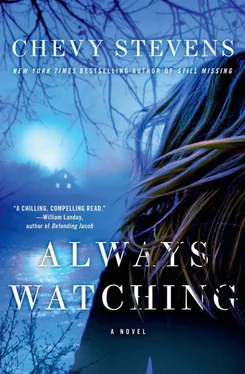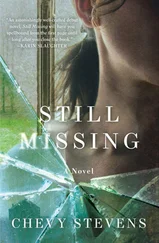I forced my mind back to the present.
“It’s natural to think of things you could’ve done differently, but this isn’t your fault, Heather. Your parents would want you to be happy. The best thing you can do for them now is to continue with your care plan and live a good life.”
“I always thought that my dad would be proud of me one day, once I got myself together, you know? That’s why I was starting to feel better last week. I was thinking that I could go back to school, maybe for design, get a good job, and show my dad that I was married to this amazing husband. Now there’s no point.”
“Those are still great goals, Heather. Continue doing them for yourself.”
She shook her head. “There’s no point. I’m never going to be happy.”
“I know it feels like that right now, but trust me, you will feel happiness again in your life, and things will get better. You just have to give it some time.”
She stared at her feet, her eyes filling with tears. “I don’t care if it gets better. I just don’t ever want to feel like this again.”
* * *
The rest of the session I worked on reassuring her that the pain would pass, but she was still despondent and wanted to go back to bed. Sleep was probably the best thing for her right now, so I didn’t push her to engage too much. The next day she was sad, but not as lethargic and depressed as she was when she’d first entered the hospital. She’d been in the ward for more than three weeks at that point and was on the full dose of Effexor, which seemed to be helping her cope. When I asked if she’d been having any thoughts of hurting herself, she said no, even repeating it while she looked me in the eye. That was a good sign.
Over the next couple of days, they kept a close eye on her at the hospital. I was off for the weekend, but I called in and asked about her a couple of times, relieved to hear that she was managing. Though she was obviously grieving about her parents, she was willing to come out on the floor and watch TV with the other patients, and three days after we’d given her the bad news, she participated in one of Kevin’s meditation groups. I ran into him out in the hall at lunch on Monday.
He said, “I was happy to see Heather made it to my group today.” Along with MMPI testing, which is figuring out personality types, as well as IQ testing, Kevin also worked with anxiety groups and did some “one-to-one” counseling.
“Yes, the poor thing’s been through a lot.”
“I’d say, but she’s processing her feelings well.”
I was glad for the validation, and my shoulders unknotted. I didn’t realize until that moment just how worried I had been about her. “You think so?”
“We talked after group, and she thanked me, said it helped.”
“That’s wonderful!”
When I saw Heather the following morning, she was still lethargic and speaking slowly, but she told me that Daniel was going to bring some vacation brochures that afternoon because they’d never had a honeymoon.
I said, “That’s exciting. Maybe you can put up some photos of where you’d like to go on your trip and things you’d like to do, like a vision board.”
“Maybe.” She met my eyes. “You’re a good doctor.”
Surprised by the comment, I said, “Thanks.”
I waited for her to explain, but she didn’t say anything else. I asked a few more questions: How was she managing? Was there anything she needed? Anything she wanted to talk about? Had she any thoughts about hurting herself?
She stared at her feet and just kept answering “No” to everything, so we finished the session there. She was grieving, but in proportion to her recent loss, and I was hopeful that in time the supportive environment of the hospital would bring her back to where she was before. Then we could continue her treatment so she could go home and finally take that honeymoon with her husband. When I said good-bye, I added, “I’m going to want a postcard from your trip.”
She smiled wistfully and gave me a little wave.
I went home after work that night, pulled on my overalls, threw my hair into a careless topknot, and worked in my potting shed for a while. Normally I loved the snip, snip of my pruning shears, keeping beat with Leonard Cohen’s “Hallelujah” playing in the background—it was my therapy. But today tears dripped down my cheeks as I thought about Heather, my daughter, and Willow—all the lost girls of the world. I rubbed at my face, leaving streaks of dirt behind, and stared at the bonsai tree I’d been trying to shape. I gave up and went inside for a shower, but first I checked the cardboard box I’d left under the back steps for the cat, noticing that there was a fine coating of black hair on the blanket.
After watching some TV for a while, I talked on the phone with Connie about how I was starting to overidentify with Heather’s emotions, which was making it harder to remain a compassionate observer. Being there when she was given the news about her parents had also reminded me of the agony of telling Lisa her father had passed. I felt more at ease by the time I went to bed. I’d grown fond of Heather over the last couple of weeks and was glad she was doing better, but it would be good for both of us when she was released.
I read for a while, then I switched off the light. My heart started pounding, but I continued with the calming self-talk— You’re okay, just keep breathing, this won’t kill you— until the panic eased.
Though it was still early, I drifted into a sound sleep.
* * *
Two things happened at once: There was a loud clatter like the garbage can had been knocked over, and the phone rang. I bolted up in bed, my heart crashing into my rib cage as I tried to figure out what was happening. I heard a couple of cats screeching and realized they were fighting. The phone shrilled again. I turned on the lamp and grabbed the handset on my night table, noticing it was nine forty-five.
It was Michelle. She was trying to tell me something, but she broke off crying. Still half-asleep, I was confused for a second, thinking my worst fear was coming true, and she’d phoned to tell me Lisa was dead.
Then Michelle gathered herself together long enough to say, “Heather Simeon committed suicide tonight.” My blood roared in my ears as Michelle tried to describe the brutal scene, but she kept dissolving into tears, and I’d only catch snippets of phrases. “There was blood everywhere—we didn’t know she was in the utility room. I called code. But it was too late. She was already dead.”
“What happened? How did she get in there?” My own voice sounded high and strained as I tried to make sense of what I was hearing.
Michelle, calming down a little now that she was being asked direct questions, explained that a fight had broken out among some patients on the ward when they were having their evening snack. All the nurses were needed to break it up, and the janitor, in the middle of gathering supplies, had left the utility room unlocked while he went to clean up the dining room, where some trays and drinks had been thrown. In that brief fifteen-minute span, Heather had entered the utility room and, finding a coffee-can lid on the janitor’s cart, which he’d been about to take downstairs with some other items, had slashed her wrists. Perhaps remembering that she was interrupted before completing her last attempt, she then drank cleaner. When that still didn’t work fast enough, and she’d vomited liquid, comprised of bile and tissue from her burning esophagus, all over herself, she shoved rags down her throat. She had finally suffocated to death, her body’s last struggle for air drowned out by the sounds of the fight on the floor.
Читать дальше












